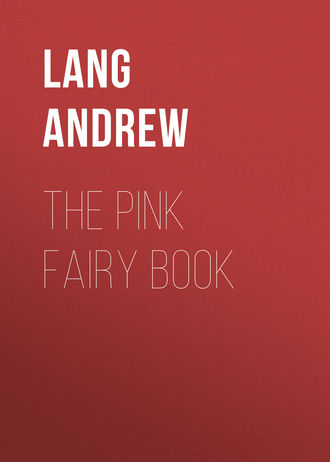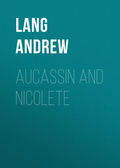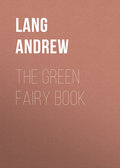
Lang Andrew
The Pink Fairy Book
‘How can I get it?’ asked the king.
‘Oh, Ciccu can get it for you; ask him.’
So the king sent for Ciccu and said to him, ‘Ciccu, you must at any price manage to get the sword of the Man-eater.’
Ciccu was very much surprised at this sudden command, and he walked thoughtfully away to the stables and began to stroke his favourite horse, saying to himself, ‘Ah, my pet, we must bid each other good-bye, for the king has sent me away to get the sword of the Maneater.’ Now this horse was not like other horses, for it was a talking horse, and knew a great deal about many things, so it answered, ‘Fear nothing, and do as I tell you. Beg the king to give you fifty gold pieces and leave to ride me, and the rest will be easy.’ Ciccu believed what the horse said, and prayed the king to grant him what he asked. Then the two friends set out, but the horse chose what roads he pleased, and directed Ciccu in everything.
It took them many days’ hard riding before they reached the country where the Man-eater lived, and then the horse told Ciccu to stop a group of old women who were coming chattering through the wood, and offer them each a shilling if they would collect a number of mosquitos and tie them up in a bag. When the bag was full Ciccu put it on his shoulder and stole into the house of the Man-eater (who had gone to look for his dinner) and let them all out in his bedroom. He himself hid carefully under the bed and waited. The Man-eater came in late, very tired with his long walk, and flung himself on the bed, placing his sword with its shining blade by his side. Scarcely had he lain down than the mosquitos began to buzz about and bite him, and he rolled from side to side trying to catch them, which he never could do, though they always seemed to be close to his nose. He was so busy over the mosquitos that he did not hear Ciccu steal softly out, or see him catch up the sword. But the horse heard and stood ready at the door, and as Ciccu came flying down the stairs and jumped on his back he sped away like the wind, and never stopped till they arrived at the king’s palace.
The king had suffered much pain in his absence, thinking that if the Man-eater ate Ciccu, it would be all his fault. And he was so overjoyed to have him safe that he almost forgot the sword which he had sent him to bring. But the two brothers did not love Ciccu any better because he had succeeded when they hoped he would have failed, and one day they spoke to the king. ‘It is all very well for Ciccu to have got possession of the sword, but it would have been far more to your majesty’s honour if he had captured the Man-eater himself.’ The king thought upon these words, and at last he said to Ciccu, ‘Ciccu, I shall never rest until you bring me back the Man-eater himself. You may have any help you like, but somehow or other you must manage to do it.’ Ciccu felt very much cast, down at these words, and went to the stable to ask advice of his friend the horse. ‘Fear nothing,’ said the horse; ‘just say you want me and fifty pieces of gold.’ Ciccu did as he was bid, and the two set out together.
When they reached the country of the Man-eater, Ciccu made all the church bells toll and a proclamation to be made. ‘Ciccu, the servant of the king, is dead.’ The Man-eater soon heard what everyone was saying, and was glad in his heart, for he thought, ‘Well, it is good news that the thief who stole my sword is dead.’ But Ciccu bought an axe and a saw, and cut down a pine tree in the nearest wood, and began to hew it into planks.
‘What are you doing in my wood?’ asked the Maneater, coming up.
‘Noble lord,’ answered Ciccu, ‘I am making a coffin for the body of Ciccu, who is dead.’
‘Don’t be in a hurry,’ answered the Man-eater, who of course did not know whom he was talking to, ‘and perhaps I can help you;’ and they set to work sawing and fitting, and very soon the coffin was finished.
Then Ciccu scratched his ear thoughtfully, and cried, ‘Idiot that I am! I never took any measures. How am I to know if it is big enough? But now I come to think of it, Ciccu was about your size. I wonder if you would be so good as just to put yourself in the coffin, and see if there is enough room.’
‘Oh, delighted!’ said the Man-eater, and laid himself at full length in the coffin. Ciccu clapped on the lid, put a strong cord round it, tied it fast on his horse, and rode back to the king. And when the king saw that he really had brought back the Man-eater, he commanded a huge iron chest to be brought, and locked the coffin up inside.
Just about this time the queen died, and soon after the king thought he should like to marry again. He sought everywhere, but he could not hear of any princess that took his fancy. Then the two envious brothers came to him and said, ‘O king! there is but one woman that is worthy of being your wife, and that is she who is the fairest in the whole world.’
‘But where can I find her?’ asked the king
‘Oh, Ciccu will know, and he will bring her to you.’
Now the king had got so used to depending on Ciccu, that he really believed he could do everything. So he sent for him and said, ‘Ciccu, unless within eight days you bring me the fairest in the whole world, I will have you hewn into a thousand pieces.’ This mission seemed to Ciccu a hundred times worse than either of the others, and with tears in his eyes he took his way to the stables.
‘Cheer up,’ laughed the horse; ‘tell the king you must have some bread and honey, and a purse of gold, and leave the rest to me.’
Ciccu did as he was bid, and they started at a gallop.
After they had ridden some way, they saw a swarm of bees lying on the ground, so hungry and weak that they were unable to fly. ‘Get down, and give the poor things some honey,’ said the horse, and Ciccu dismounted. By-and-bye they came to a stream, on the bank of which was a fish, flapping feebly about in its efforts to reach the water. ‘Jump down, and throw the fish into the water; he will be useful to us,’ and Ciccu did so. Farther along the hillside they saw an eagle whose leg was caught in a snare. ‘Go and free that eagle from the snare; he will be useful to us; ‘ and in a moment the eagle was soaring up into the sky.
At length they came to the castle where the fairest in the world lived with her parents. Then said the horse, ‘You must get down and sit upon that stone, for I must enter the castle alone. Directly you see me come tearing by with the princess on my back, jump up behind, and hold her tight, so that she does not escape you. If you fail to do this, we are both lost.’ Ciccu seated himself on the stone, and the horse went on to the courtyard of the castle, where he began to trot round in a graceful and elegant manner. Soon a crowd collected first to watch him and then to pat him, and the king and queen and princess came with the rest. The eyes of the fairest in the world brightened as she looked, and she sprang on the horse’s saddle, crying, ‘Oh, I really must ride him a little!’ But the horse made one bound forward, and the princess was forced to hold tight by his mane, lest she should fall off. And as they dashed past the stone where Ciccu was waiting for them, he swung himself up and held her round the waist. As he put his arms round her waist, the fairest in the world unwound the veil from her head and cast it to the ground, and then she drew a ring from her finger and flung it into the stream. But she said nothing, and they rode on fast, fast.
The king of Ciccu’s country was watching for them from the top of a tower, and when he saw in the distance a cloud of dust, he ran down to the steps so as to be ready to receive them. Bowing low before the fairest in the world, he spoke: ‘Noble lady, will you do me the honour to become my wife?’
But she answered, ‘That can only be when Ciccu brings me the veil that I let fall on my way here.’
And the king turned to Ciccu and said, ‘Ciccu, if you do not find the veil at once, you shall lose your head.’
Ciccu, who by this time had hoped for a little peace, felt his heart sink at this fresh errand, and he went into the stable to complain to the faithful horse.
‘It will be all right,’ answered the horse when he had heard his tale; ‘just take enough food for the day for both of us, and then get on my back.’
They rode back all the way they had come till they reached the place where they had found the eagle caught in the snare; then the horse bade Ciccu to call three times on the king of the birds, and when he replied, to beg him to fetch the veil which the fairest in the world had let fall.
‘Wait a moment,’ answered a voice that seemed to come from somewhere very high up indeed. ‘An eagle is playing with it just now, but he will be here with it in an instant;’ and a few minutes after there was a sound of wings, and an eagle came fluttering towards them with the veil in his beak. And Ciccu saw it was the very same eagle that he had freed from the snare. So he took the veil and rode back to the king.
Now the king was enchanted to see him so soon, and took the veil from Ciccu and flung it over the princess, crying, ‘Here is the veil you asked for, so I claim you for my wife.’
‘Not so fast,’ answered she. ‘I can never be your wife till Ciccu puts on my finger the ring I threw into the stream. Ciccu, who was standing by expecting something of the sort, bowed his head when he heard her words, and went straight to the horse.
‘Mount at once,’ said the horse; ‘this time it is very simple,’ and he carried Ciccu to the banks of the little stream. ‘Now, call three times on the emperor of the fishes, and beg him to restore you the ring that the princess dropped.
Ciccu did as the horse told him, and a voice was heard in answer that seemed to come from a very long way off.
‘What is your will?’ it asked; and Ciccu replied that he had been commanded to bring back the ring that the princess had flung away, as she rode past.
‘A fish is playing with it just now,’ replied the voice; ‘however, you shall have it without delay.’
And sure enough, very soon a little fish was seen rising to the surface with the lost ring in his mouth. And Ciccu knew him to be the fish that he had saved from death, and he took the ring and rode back with it to the king.
‘That is not enough,’ exclaimed the princess when she saw the ring; ‘before we can be man and wife, the oven must be heated for three days and three nights, and Ciccu must jump in.’ And the king forgot how Ciccu had served him, and desired him to do as the princess had said.
This time Ciccu felt that no escape was possible, and he went to the horse and laid his hand on his neck. ‘Now it is indeed good-bye, and there is no help to be got even from you,’ and he told him what fate awaited him.
But the horse said, ‘Oh, never lose heart, but jump on my back, and make me go till the foam flies in flecks all about me. Then get down, and scrape off the foam with a knife. This you must rub all over you, and when you are quite covered, you may suffer yourself to be cast into the oven, for the fire will not hurt you, nor anything else.’ And Ciccu did exactly as the horse bade him, and went back to the king, and before the eyes of the fairest in the world he sprang into the oven.
And when the fairest in the world saw what he had done, love entered into her heart, and she said to the king, ‘One thing more: before I can be your wife, you must jump into the oven as Ciccu has done.’
‘Willingly,’ replied the king, stooping over the oven. But on the brink he paused a moment and called to Ciccu, ‘Tell me, Ciccu, how did you manage to prevent the fire burning you?’
Now Ciccu could not forgive his master, whom he had served so faithfully, for sending him to his death without a thought, so he answered, ‘I rubbed myself over with fat, and I am not even singed.’
When he heard these words, the king, whose head was full of the princess, never stopped to inquire if they could be true, and smeared himself over with fat, and sprang into the oven. And in a moment the fire caught him, and he was burned up.
Then the fairest in the world held out her hand to Ciccu and smiled, saying, ‘Now we will be man and wife.’ So Ciccu married the fairest in the world, and became king of the country.
Don Giovanni De La Fortuna
Sicilianische Mahrchen
There was once a man whose name was Don Giovanni de la Fortuna, and he lived in a beautiful house that his father had built, and spent a great deal of money. Indeed, he spent so much that very soon there was none left, and Don Giovanni, instead of being a rich man with everything he could wish for, was forced to put on the dress of a pilgrim, and to wander from place to place begging his bread.
One day he was walking down a broad road when he was stopped by a handsome man he had never seen before, who, little as Don Giovanni knew it, was the devil himself.
‘Would you like to be rich,’ asked the devil, ‘and to lead a pleasant life?’
‘Yes, of course I should,’ replied the Don.
‘Well, here is a purse; take it and say to it, “Dear purse, give me some money,” and you will get as much as you can want But the charm will only work if you promise to remain three years, three months, and three days without washing and without combing and without shaving your beard or changing your clothes. If you do all this faithfully, when the time is up you shall keep the purse for yourself, and I will let you off any other conditions.’
Now Don Giovanni was a man who never troubled his head about the future. He did not once think how very uncomfortable he should be all those three years, but only that he should be able, by means of the purse, to have all sorts of things he had been obliged to do without; so he joyfully put the purse in his pocket and went on his way. He soon began to ask for money for the mere pleasure of it, and there was always as much as he needed. For a little while he even forgot to notice how dirty he was getting, but this did not last long, for his hair became matted with dirt and hung over his eyes, and his pilgrim’s dress was a mass of horrible rags and tatters.
He was in this state when, one morning, he happened to be passing a fine palace; and, as the sun was shining bright and warm, he sat down on the steps and tried to shake off some of the dust which he had picked up on the road. But in a few minutes a maid saw him, and said to her master, ‘I pray you, sir, to drive away that beggar who is sitting on the steps, or he will fill the whole house with his dirt.’
So the master went out and called from some distance off, for he was really afraid to go near the man, ‘You filthy beggar, leave my house at once!’
‘You need not be so rude,’ said Don Giovanni; ‘I am not a beggar, and if I chose I could force you and your wife to leave your house.’
‘What is that you can do?’ laughed the gentleman.
‘Will you sell me your house?’ asked Don Giovanni. ‘I will buy it from you on the spot.’
‘Oh, the dirty creature is quite mad!’ thought the gentleman. ‘I shall just accept his offer for a joke.’ And aloud he said: ‘ All right; follow me, and we will go to a lawyer and get him to make a contract.’ And Don Giovanni followed him, and an agreement was drawn up by which the house was to be sold at once, and a large sum of money paid down in eight days. Then the Don went to an inn, where he hired two rooms, and, standing in one of them, said to his purse, ‘ Dear purse, fill this room with gold;’ and when the eight days were up it was so full you could not have put in another sovereign.
When the owner of the house came to take away his money Don Giovanni led him into the room and said: ‘There, just pocket what you want.’ The gentleman stared with open mouth at the astonishing sight; but he had given his word to sell the house, so he took his money, as he was told, and went away with his wife to look for some place to live in. And Don Giovanni left the inn and dwelt in the beautiful rooms, where his rags and dirt looked sadly out of place. And every day these got worse and worse.
By-and-bye the fame of his riches reached the ears of the king, and, as he himself was always in need of money, he sent for Don Giovanni, as he wished to borrow a large sum. Don Giovanni readily agreed to lend him what he wanted, and sent next day a huge waggon laden with sacks of gold.
‘Who can he be?’ thought the king to himself. ‘Why, he is much richer than I!’
The king took as much as he had need of; then ordered the rest to be returned to Don Giovanni, who refused to receive it, saying, ‘Tell his majesty I am much hurt at his proposal. I shall certainly not take back that handful of gold, and, if he declines to accept it, keep it yourself.’
The servant departed and delivered the message, and the king wondered more than ever how anyone could be so rich. At last he spoke to the queen: ‘Dear wife, this man has done me a great service, and has, besides, behaved like a gentleman in not allowing me to send back the money. I wish to give him the hand of our eldest daughter.’
The queen was quite pleased at this idea, and again messenger was sent to Don Giovanni, offering him the hand of the eldest princess.
‘His majesty is too good,’ he replied. ‘I can only humbly accept the honour.’
The messenger took back this answer, but a second time returned with the request that Don Giovanni would present them with his picture, so that they might know what sort of a person to expect. But when it came, and the princess saw the horrible figure, she screamed out, ‘What! marry this dirty beggar? Never, never!’
‘Ah, child,’ answered the king, ‘how could I ever guess that the rich Don Giovanni would ever look like that? But I have passed my royal word, and I cannot break it, so there is no help for you.’
‘No, father; you may cut off my head, if you choose, but marry that horrible beggar – I never will!’
And the queen took her part, and reproached her husband bitterly for wishing his daughter to marry a creature like that.
Then the youngest daughter spoke: ‘Dear father, do not look so sad. As you have given your word, I will marry Don Giovanni.’ The king fell on her neck, and thanked her and kissed her, but the queen and the elder girl had nothing for her but laughs and jeers.
So it was settled, and then the king bade one of his lords go to Don Giovanni and ask him when the wedding day was to be, so that the princess might make ready.
‘Let it be in two months,’ answered Don Giovanni, for the time was nearly up that the devil had fixed, and he wanted a whole month to himself to wash off the dirt of the past three years.
The very minute that the compact with the devil had come to an end his beard was shaved, his hair was cut, and his rags were burned, and day and night he lay in a bath of clear warm water. At length he felt he was clean again, and he put on splendid clothes, and hired a beautiful ship, and arrived in state at the king’s palace.
The whole of the royal family came down to the ship to receive him, and the whole way the queen and the elder princess teased the sister about the dirty husband she was going to have. But when they saw how handsome he really was their hearts were filled with envy and anger, so that their eyes were blinded, and they fell over into the sea and were drowned. And the youngest daughter rejoiced in the good luck that had come to her, and they had a splendid wedding when the days of mourning for her mother and sister were ended.
Soon after the old king died, and Don Giovanni became king. And he was rich and happy to the end of his days, for he loved his wife, and his purse always gave him money.







